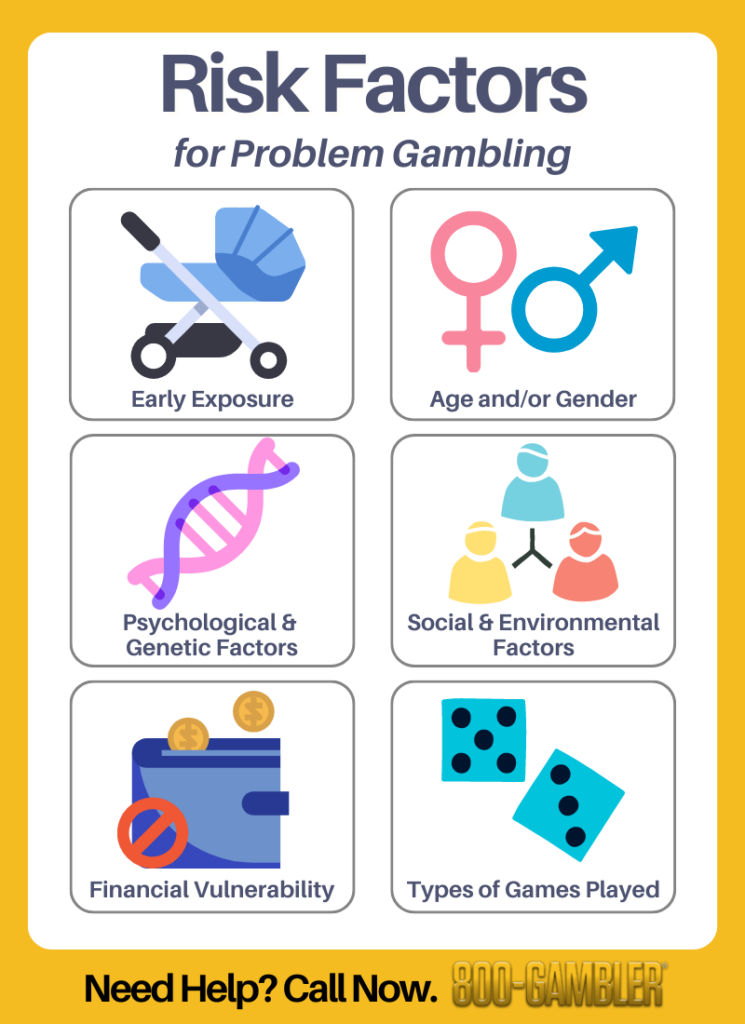When done in moderation, gambling can be a thrilling pastime for many. However, when it shifts from an occasional recreational activity to a frequent necessity, the resulting consequences can be devastating.
So what might predispose someone to engage in problem gambling? Everyone’s risk factors are different, but research has indicated several factors may be more influential than others. It is crucial to understand the risk factors associated with the development of problem gambling habits to promote responsible gambling practices and provide support to those in need. Read on to find out more about this important topic.

Early Exposure
Early exposure to gambling can significantly influence an individual’s risk of developing problematic gambling habits later in life. A study conducted by McGill University found that individuals who were exposed to gambling during their childhood or adolescence were more likely to develop gambling-related problems as adults. This early exposure may normalize gambling behavior, making it more difficult for individuals to recognize and address the potential risks.
Age & Gender
Another critical factor worth examining is age. A comprehensive survey published in the Acta Psychiatrica Scandinavica journal found that age played a pivotal role in the development of problem gambling habits amongst Swedish adults. Younger individuals, particularly those in their late teens and early twenties, seem to be most at risk. This could be attributed to a variety of factors, such as increased impulsivity, societal pressures, and the allure of risk-taking behavior that is often associated with this age group.
Gender also plays a significant role, with males being more prone to developing problem gambling habits. The reasons behind this gender disparity are complex and multifaceted, involving a mix of social, psychological, and cultural influences. It’s crucial to understand that these demographic factors are not determinants but rather potential risk indicators.
Psychological & Genetic Factors
Various psychological factors can contribute to the development of problem gambling habits. Personality traits such as impulsivity and sensation-seeking have been linked to an increased risk of problematic gambling behaviors. According to a 2002 study by the University of Sydney, individuals with these traits may be more inclined to engage in risky behaviors, including excessive gambling. The interaction between these psychological factors and gambling behavior can create a higher vulnerability to developing gambling-related problems.
Additionally, individuals with pre-existing mental health conditions, such as depression or anxiety, may have a heightened risk of developing problematic gambling habits. These conditions can interact with gambling behavior, leading to a cycle that exacerbates both the mental health issues and the gambling habits.
Family history and genetic factors can also contribute to an individual’s risk of developing problem gambling habits. Research suggests that individuals with a family history of gambling problems may have a higher predisposition to develop gambling-related issues themselves. One large study by the University of Missouri-Columbia indicated that genetic factors may account for a significant portion of the variance in problem gambling behaviors. However, it is essential to note that genetic predisposition is not deterministic, and environmental factors also play a crucial role.
Social & Environmental Factors
Social and environmental factors can significantly impact an individual’s risk of developing problem gambling habits. Peer influence, cultural norms surrounding gambling, and societal attitudes towards gambling can all play a role in shaping an individual’s relationship with gambling.
For instance, one study by the University of Buffalo revealed that individuals who perceive gambling as socially acceptable may be more likely to engage in excessive gambling. The influence of friends, family members, or the wider community can shape an individual’s perception of gambling and contribute to the development of problematic behaviors.
Moreover, the availability and accessibility of gambling opportunities can increase the risk of developing problem gambling habits. The proximity of casinos, the availability of online gambling platforms, and the ease of access to gambling activities can all contribute to excessive gambling behavior. (See also: What are touts?)
Financial Vulnerability
Financial vulnerability is another significant risk factor associated with the development of problem gambling habits. Financial stress, debt, and socioeconomic factors can increase an individual’s susceptibility to problematic gambling behaviors. Some individuals may turn to gambling as a potential solution to their financial difficulties, hoping to win and alleviate their financial burdens. However, this can lead to a cycle of increased gambling and further financial strain.
Types of Games Played
Research has indicated that certain types of gambling may be more likely to lead to issues than others. Slot machines, for instance, have been identified as a type of gambling that can potentially lead to problem gambling. The fast pace, immediate rewards, and captivating visuals and sounds associated with these games can make them particularly enticing and potentially problematic for some individuals. However, problem gambling can happen with all types of games, even financial gambles such as day trading (see also: is day trading gambling?).
The Bigger Picture
Understanding the risk factors associated with the development of problem gambling habits is crucial for prevention, early intervention, and support. Factors such as early exposure to gambling, age and gender, psychological traits, social and environmental influences, financial vulnerability, and family history can all contribute to an individual’s susceptibility to developing problematic gambling behaviors. However, it’s important to remember that having these risk factors does not guarantee that a person is guaranteed to develop problem gambling habits — or that someone without these risk factors cannot develop a gambling problem.
If you or someone you know is facing challenges related to gambling, reaching out to a trusted helpline or support service like 800-GAMBLER can provide the necessary guidance and assistance. Our toll-free, confidential helpline is open 24/7. Remember, seeking help is a sign of strength, and support is available. We’re waiting to hear from you!



